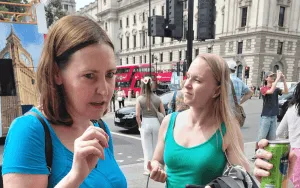A disabled woman left traumatised by the daily demands of the universal credit system took her own life just four days after being told she would need to attend a face-to-face meeting with a work coach, her family say.
Rebecca*, a former manager, would shake and cry every time she had to log onto her online universal credit “journal”, which she was forced to do every weekday to avoid having her benefits sanctioned.
Although she had been given a six-month “fit note” by her doctor that explained that she was not fit for work, she was still expected to have regular appointments with a work coach until her fitness for work could be assessed by the Department for Work and Pensions (DWP) contractor Maximus.
DWP had been told of her mental distress, suicidal thoughts and fear of the department and the universal credit system.
Her mother, Debra*, who lived near her daughter’s home, said the idea of always having to be under the surveillance of DWP and its universal credit system left her in despair.
Rebecca told her mother: “They will always want to know where I am going, how much money I have got. They will always be in my life, they will always want to know.”
She was so concerned that she might make an error and be sanctioned by DWP that she did not turn on the central heating in her flat for the last two months of her life, to try to save money.
She wouldn’t even allow her parents to pay the bill in case DWP saw the payment in her bank account and treated it as income.
Debra does not want her daughter to be identified until an inquest into her death takes place, which is likely to be early next year, but she has asked the coroner to investigate the role DWP and the universal credit system played in her daughter’s death.
Disability News Service (DNS) has been speaking to Debra for several months but cannot confirm the details of what happened to her daughter with DWP, although DNS has shared anonymised details of Rebecca’s ordeal with the department.
Further evidence of Rebecca’s treatment by DWP is likely to emerge at the inquest, but DNS has decided to publish her mother’s uncorroborated claims now because they mirror concerns being raised by other disabled people who claim universal credit and have contacted DNS (see other stories).
Debra said she had spoken out now about her daughter’s suicide in the hope that it will force changes to make the universal credit system safer and prevent further deaths.
She said: “I have always been a law-abiding citizen but now I feel like getting my walking stick and going round to the jobcentre and smashing it up, just to get my day in court.”
She believes it is crucial to find out how many people on universal credit have taken their own lives, and she is appalled that no such figures are collected.
Debra also says her daughter’s death has highlighted DWP’s continuing failure to accept that its staff have a duty of care to benefit claimants.
Rebecca’s death came as DWP was preparing to begin its “managed migration” of hundreds of thousands of claimants of old-style benefits such as employment and support allowance onto universal credit, with growing fears of the impact the new system will have on people with mental distress and other impairments.
Rebecca is the latest of countless benefit claimants whose deaths have been linked closely to DWP’s actions over the last decade.
The local mental health service-provider had persuaded DWP to allow Rebecca’s first appointment with a work coach to take place on the phone, with a mental health support worker with her at home.
But during the call, Rebecca was told by the work coach: “We have let you off this time, but you will have to come to the jobcentre next time.”
Just a week later, she took her own life. Her funeral took place early this summer.
The previous time she had visited the jobcentre, in January, she had been accompanied by her brother, who said later that she had been “absolutely terrified” by the ordeal.
By the time she died, she weighed less than five stone.
Rebecca, who also had a long-term health condition, leased a car through the Motability scheme with the mobility support she received through personal independence payment.
She had left her part-time job late last year, started a claim for universal credit on 1 January, and informed DWP she believed she was no longer fit for work.
Before Christmas, she had been so unwell that her brother, who was working from home, would go to his sister’s flat to work so he could look after her during the day because the family were concerned she might take her own life.
Even then Rebecca was concerned that DWP would think she was not living alone, as she had told them, and would accuse her of benefit fraud.
Her mother would take food to her daughter’s flat several times a week, and her partner – who did not live with her – was feeding her in the evenings, but the severe anxiety had caused her to lose weight.
Rebecca was likely to have eventually been declared not fit for work, but she had been waiting for a work capability assessment since completing a questionnaire in January.
Debra told DNS: “When it came to the capability for work, she said, ‘I won’t get it, I won’t get it.’ She was dreading the process.”
A letter eventually arrived several weeks after she took her own life, with details of an appointment for a telephone assessment that would have taken place 23 weeks after she submitted her claim and a fit note from her GP.
Universal credit claimants should normally have their assessment within 13 weeks of submitting their fit note.
Debra said Rebecca would leave her flat only once a week, to attend a local pub quiz that she knew her 17-year-old daughter enjoyed, but even then she needed someone to hold her hand on the walk to the car.
Debra said: “The DWP knew my daughter and they knew she was frightened of the DWP.
“Every time you mentioned the jobcentre and DWP, there were tears.”
Debra says that her daughter was a kind, generous and thoughtful person.
She said: “Through the pandemic she had more money than she needed so she decided to support a local family who were on universal credit and was sending them food parcels every fortnight because she wasn’t going out and was getting maintenance, and her money was building up.”
Debra is clear that it was not universal credit that was the cause of her daughter’s depression, but she is certain that it was the “final straw”.
A previous experience of claiming universal credit three years ago had left her traumatised.
Debra said: “She was just petrified of universal credit, of breaking the rules and going to jail.
“She was just panicking about everything, but universal credit was the thing that was pushing her and pushing her.
“My daughter was about five feet tall, but she weighed less than five stone. What did she need a work coach for?”
DWP this week refused to answer a series of questions about the safety concerns around universal credit.
It refused to say if it needed to make changes to ensure the safety of universal credit, whether it believed claimants were being hounded through their online journals, and if it would collect figures showing how many people on universal credit were taking their own lives.
Instead, a DWP spokesperson claimed in a statement that an “emphasis is placed on protecting vulnerable claimants”.
She added: “Universal credit offers a vital safety net to millions of people, enabling them to support themselves and their families while building towards financial independence through work.”
*Not their real names

 Disabled MP who quit government over benefit cuts tells DNS: ‘The consequences will be devastating’
Disabled MP who quit government over benefit cuts tells DNS: ‘The consequences will be devastating’ Minister finally admits that working-age benefits spending is stable, despite months of ‘spiralling’ claims
Minister finally admits that working-age benefits spending is stable, despite months of ‘spiralling’ claims Timms says cuts must go ahead, despite being reminded of risk that disabled claimants could die
Timms says cuts must go ahead, despite being reminded of risk that disabled claimants could die